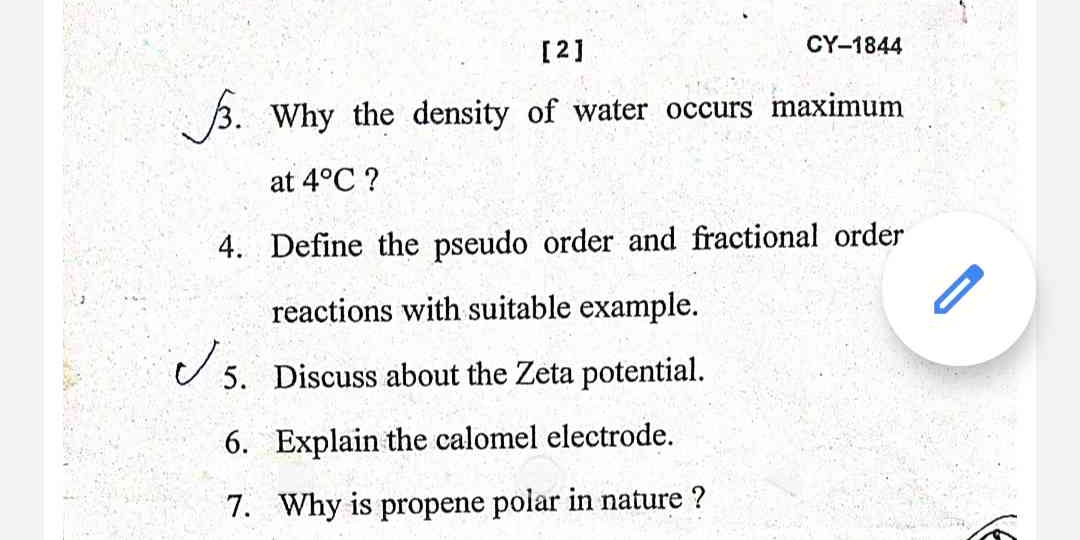Why does the density of water occur maximum at 4°C? Define the pseudo order and fractional order reactions with suitable examples. Discuss the Zeta potential. Explain the calomel e... Why does the density of water occur maximum at 4°C? Define the pseudo order and fractional order reactions with suitable examples. Discuss the Zeta potential. Explain the calomel electrode. Why is propene polar in nature?

Understand the Problem
The questions are related to chemistry concepts, including the density of water at 4°C, pseudo order and fractional order reactions, Zeta potential, calomel electrode, and the polarity of propene. They seek explanations and definitions of these scientific principles.
Answer
Density of water peaks at 4°C; pseudo order reactions simplify complex kinetics; Zeta potential affects particle stability; calomel electrode is a reference used in electrochemistry; propene is polar due to its double bond.
The density of water is maximum at 4°C due to the balance of hydrogen bonding and molecular motion. Pseudo order reactions simplify complex kinetics by assuming one reactant is in large excess. Fractional order reactions occur when the order is not a whole number, like the decomposition of hydrogen peroxide. Zeta potential indicates how a particle in a fluid will interact with others, affecting stability. The calomel electrode is a reference electrode consisting of mercury and mercury chloride, used to measure electrode potentials. Propene is polar due to its double bond, creating a dipole moment.
Answer for screen readers
The density of water is maximum at 4°C due to the balance of hydrogen bonding and molecular motion. Pseudo order reactions simplify complex kinetics by assuming one reactant is in large excess. Fractional order reactions occur when the order is not a whole number, like the decomposition of hydrogen peroxide. Zeta potential indicates how a particle in a fluid will interact with others, affecting stability. The calomel electrode is a reference electrode consisting of mercury and mercury chloride, used to measure electrode potentials. Propene is polar due to its double bond, creating a dipole moment.
More Information
Water's anomalous density behavior is crucial for aquatic life, preventing bodies of water from freezing solid. Pseudo-first-order reactions often involve one reactant in excess, simplifying rate laws. Zeta potential is key in colloid stability, while calomel electrodes are essential in accurate pH measurement.
Tips
Common mistakes in understanding reaction orders include confusing the actual order with the apparent order due to assumptions like excess reactants. When calculating reaction kinetics, ensure to confirm conditions fit the pseudo order approximation.
Sources
- Properties of water - Wikipedia - en.wikipedia.org
- 2.8.1: Pseudo-1st-order Reactions - Chemistry LibreTexts - chem.libretexts.org
- Zeta potential - An introduction in 30 minutes - research.colostate.edu
AI-generated content may contain errors. Please verify critical information